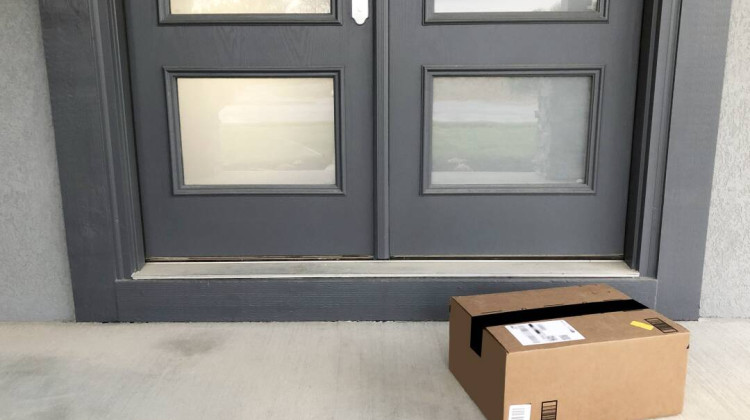
The Joliet Treatment Center, located just southwest of Chicago, is one of three mental health treatment facilities now providing mental health care to 765 of Illinois' sickest inmates. The facilities were created as part of a lawsuit settlement. (Christine Herman/Illinois Public Media)
Ashoor Rasho has spent more than half of his life alone in a prison cell — 22 to 24 hours a day. The cell was so narrow he could reach his arms out and touch both walls at once.
“It was pretty broke down, the whole system, the way they treated us,” says the 43-year-old Rasho, who has several mental health conditions.
He says little things would trigger him and he’d react violently. Although he was arrested for robbery and burglary, his sentence was extended over and over for assaults on prison staff.
“Even if they would label us schizophrenic or bipolar, we would still be considered behavioral problems,” he says. “So the only best thing for them to do was keep us isolated. Or they heavily medicate you.”
Listen to Part 1: Problems in Illinois prisons
Listen to Part 2: A look at proposed solutions
In 2007, Rasho and 12,000 other inmates with mental illness sued the Illinois Department of Corrections, alleging the agency punishes inmates with mental illness instead of properly treating them.
Punishment, not treatment
Even state officials acknowledge the prison system has not done well for inmates with mental illness.
“Corrections in Illinois was a little slow to recognize we are the mental health system for Illinois,” says John Baldwin, director of the corrections department. “Whether we want to be or not, we are; and we have to start acting like it.”
Baldwin says since he took over in 2015, the department has hired more mental health staff and provided training to all employees on how to engage with people with mental illness. Most inmates now spend at least eight hours a week out of their cell and see a therapist once a month.
And about 765 of the sickest inmates have been transferred to new residential treatment facilities where they’re finally receiving appropriate care.
But Mills points out: That’s a small fraction of the 12,000 who are mentally ill.
“And for the vast majority of those, not a lot has changed,” he says. “They simply aren’t getting the kind of treatment they need in order to improve their situation at all.”
The Joliet Treatment Center in the southwest suburbs of Chicago doesn’t look like a typical prison facility.
Half a dozen single-story buildings—called dorms—surround a big grassy area. Walking paths connect the dorms.
“I always refer to it as the quad,” Warden Andrea Tack says, on a recent tour. “It reminds me of some of the college campuses that have (a) big center lawn area and then all the classrooms surround it.”
But unlike a college campus, this facility is surrounded by two layers of barbed-wire fence.
A few years ago, Illinois spent $17 million to convert the former youth detention center into a mental health treatment facility for inmates with serious mental illness.
The dining hall is at the center of the quad, the gym is just to the east, and a building to the south houses a library, medical clinic, and classrooms where inmates take GED courses and receive job training.
Tack says the inmates here spend about 30 hours a week out of their cell in various activities, according to their individual treatment plans.
She’s seen inmates who’ve been transferred here make huge strides over the past year.
People who were attempting to hang themselves and acting out aggressively, “now, they’re out and about in the community, going to classes, going to meals, interacting with others,” Tack says. “Some are serving as mentors for other residents.”
Mills has seen this transformation in some Joliet inmates, too.
“And it’s a difficult transition, because you’ve been treated in a place where you’re continually traumatized, and then you get to a place where actually people care about you,” he says.
Mills says it takes time for many to learn that they can trust and receive help, instead of acting out aggressively the way they’ve been conditioned to do for so many years.
The atmosphere at the Joliet center stands in stark contrast to some of the state’s other prisons, such as Pontiac Correctional Center, located about 60 miles south of Joliet.
There, inmates with mental illness are often kept isolated and are lucky to get even one hour of treatment a month, says Dr. Pablo Stewart, a psychiatrist. He was appointed by the federal court to oversee the settlement in the lawsuit.
In his most recent report, Stewart singled out the prison at Pontiac for have a “culture of abuse and retaliation” against mentally ill inmates.
“Almost everyone at the mental health unit at Pontiac should be at Joliet,” Stewart says.
If they were getting that same level of mental health care, Stewart says they wouldn’t have as many behavior issues.
The Pontiac prison has a high concentration of inmates with behavior problems because the most challenging inmates get transferred there from prison facilities across the state.
And the facility lacks the necessary mental health staff to provide treatment to everyone who needs it.
As a result, Stewart says many mentally ill inmates get placed in segregation with little or no meaningful social interaction. The conditions cause them to deteriorate, making them more prone to acting out.
“These people in segregation who are mentally ill end up throwing feces or urine at staff, end up exposing themselves, masturbating in front of female staff,” he says.
Inmates with untreated mental illness also get into fights with other inmates and prison staff.
Stewart says the workers themselves are traumatized from their job, making them prone to retaliate. Based on interviews with both inmates and staff, Stewart says he’s absolutely convinced the staff abuse inmates at Pontiac.
Asked about the abuse allegations at Pontiac, corrections department spokesperson Lindsey Hess said in an email that the agency takes allegations of excessive force seriously and investigates them.
In an interview prior to the latest court monitor’s report, Baldwin said he would “be surprised” if inmates with mental illness were being abused today.
“We take swift action to refer [any reports of abuse] we get to the state police or the state’s attorney,” he said. “We will not tolerate that.”
As for prison staff who may be traumatized by their job, Hess said the agency has implemented several initiatives in recent years to improve the mental, physical and emotional well-being of employees.
These include peer support groups, access to professional counselors and a recurring class, “From Corrections Fatigue to Fulfillment,” that teaches staff about the psychological dynamics of corrections.
Stewart says Joliet is one Illinois facility that’s finally providing inmates with adequate mental health treatment. That should be the norm everywhere—but it’s not.
“That’s the standard of care that’s required,” Stewart says.
When Rasho was interviewed last May, he’d been out of prison for more than a year. But he said his many years spent in solitary confinement still haunted him.
“I don’t sleep right,” he says. “Any little thing triggers something in me.”
Last fall, Rasho was arrested again, so he’s back in the prison system.
Mills says the situation in Illinois shows that lawsuits don’t always solve the problems—at least not right away.
“A court order is great, but it’s a piece of paper,” he says. “It’s not actually treatment.”
The orders from U.S. District Judge Michael Mihm continue.
Days before Christmas, he ordered Illinois’ prison agency to correct widespread deficiencies. He gave the agency until March to hire enough mental health staff to provide adequate care to all inmates who needs it.
This story was produced by Side Effects Public Media, a news collaborative covering public health.
Christine Herman is a recipient of the 2018-2019 Rosalynn Carter Fellowships for Mental Health Journalism. Follow her on Twitter: @CTHerman
An obvious problem
Sign of progress

Nearly 800 inmates with serious mental illness have been transferred to Joliet Treatment Center and three other similar treatment facilities. Two layers of barbed-wire fence surround the campus, which includes single-story "dorms," a dining hall, a gym, and a vocational building. (Christine Herman/Illinois Public Media)
'Culture of abuse'
A lingering problem
 DONATE
DONATE








 Support WFYI. We can't do it without you.
Support WFYI. We can't do it without you.